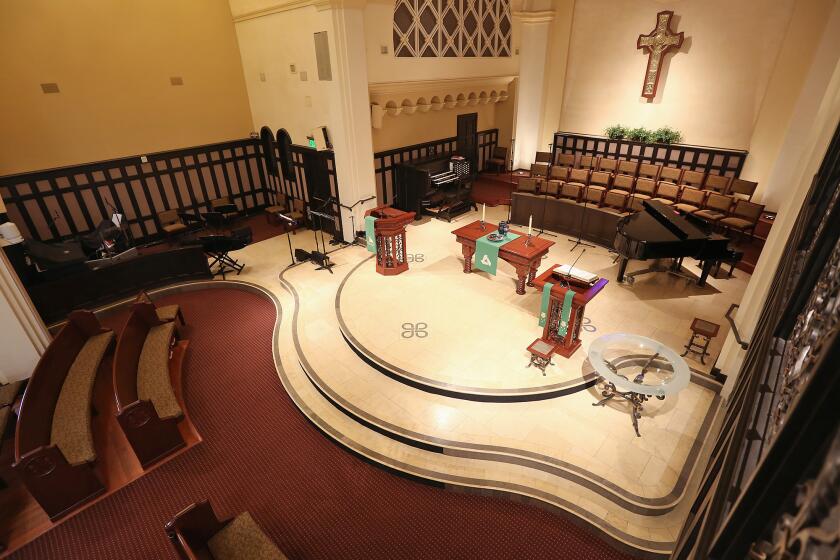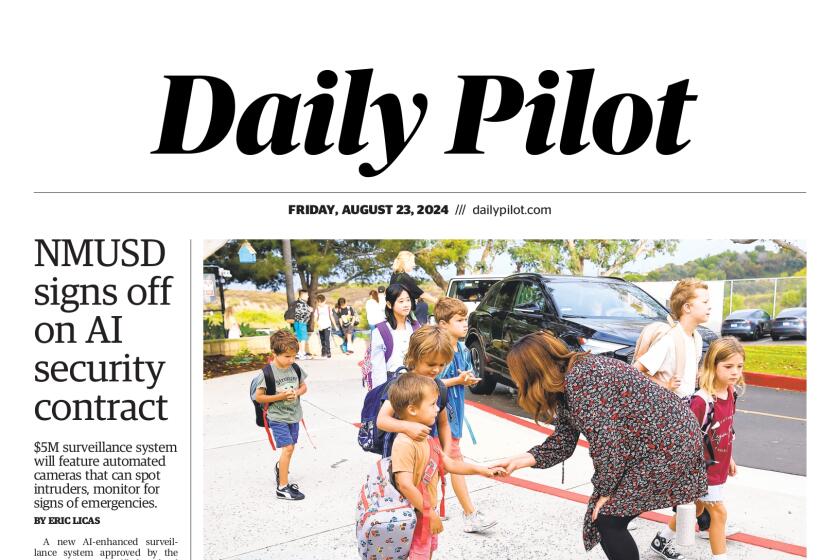CHECKING IN WITH ... Ted Bremner:
It’s times like these that really have you wondering if maybe you should just stuff your money under the mattress instead of a bank. Forget Wall Street. Even Gordon Gekko would be on the ledge these days. So we thought it would be a good time to check in with Ted Bremner, the Harbor View branch manager of Union Bank in Newport Beach, for some sound advice.
We hate to start off the interview with a downer, but “What the heck should I do with my money?” For years, folks were told the stock market was best, but a lot of investors lost money during the summer meltdown. For your average customer, who’s not exactly a big Wall Street investor, where’s the best place to put your money these days?
Considering the current state of the economy, consumers have a number of options available to suit their needs. For individuals seeking a fiscally conservative approach, it may be a good idea to consider placing some money in savings and/or retirement accounts insured by the Federal Deposit Insurance Corporation (FDIC). If liquidity is the priority, an FDIC-insured, high-interest savings account may be a good option. Certificates of deposit (CDs), with terms often ranging from one to five years, may also be a good option for the conservative-minded saver. For consumers seeking added liquidity, it may be a good idea to ladder CDs — invest in multiple CDs with varying maturity dates — to maximize the distribution of interest and available cash. Treasuries and bonds are another option. Like CDs, they can also be laddered for optimal liquidity.
Another important element to consider is where consumers hold their accounts. When researching financial institutions, well-managed, conservative institutions with a conservative lending track record are optimal. I am proud to say that at Union Bank, we didn’t operate in the sub-prime market and we have an exceptionally high-quality residential loan portfolio, which is among the best in the country. In addition, our credit quality is extremely strong, and we have abundant capital resources.
Are things a lot better here in Newport Beach as far as the financial crisis goes? It would seem so, but there are still scary reminders like the failure of Downey Savings.
While our Newport Beach branches are doing well with a solid, long-term client base, there is no doubt that the uncertain economic climate has affected the mindset of many. Frugality is now a priority. “Save, save, save” is the new mantra. With this in mind, representatives in our four Newport Beach branches are happy to meet with our clients and discuss the best savings options to meet their unique needs.
Since the credit market seized up in September, it’s been tough for even folks with good credit to get loans. Has that improved some since Washington approved the bailout money for banks?
I believe time will tell with regard to the effects of the “bailout.” Credit is currently a scarce commodity. Unfortunately, this affects everyone, even folks with good credit. It is important to keep in mind that financial institutions are taking a conservative approach when it comes to lending to make sure they meet their required reserve amounts. When loans are not repaid, a bank must look to its reserves to cover the losses. In this economic environment, banks must take a more conservative approach to lending to protect their reserves.
We continue to write loans to individuals and businesses, we’re just more conservative about it. When making small business loans, for example, we look for people who are tightening their belts, who can demonstrate a positive cash flow, solid management, and who have owners with good personal credit. Then, absolutely, we’ll make those loans.
Should parents worry about getting college loans with the credit market so tough?
Although the credit market is tighter these days, parents should not be discouraged. Contacting the financial aid offices at the colleges and universities and comparing loan rates will provide valued insight about the types and terms of loans available. It is also important to decide on a loan amount based on needs rather than wants. By doing so, parents can avoid borrowing more than necessary. Another important option available to students is grants and scholarships that can help minimize educational expenses.
What do you think of the financial team President Obama has assembled? Do you think the country can turn this around by next year as some economists have predicted?
The team has a large task at hand as we embark on 2009.
With regard to the country being able to turn this around, I think it depends on many factors including the specifics of the recovery plan and how soon banks are able to ease lending.
What made you want to go into banking? What is it about this business that satisfies you the most?
I’m proud to have followed in the footsteps of both my grandfather and father, who were both in banking. After I graduated from college, I embarked on my banking career by answering an ad and being recruited by a major bank for their officer development program. From there, I ventured forward into what has become a very fulfilling career.
What is most satisfying to me is building lasting customer relationships. I’m proud to say that I still bank many customers that I began working with in the late 1970s.
How do you think the banking industry will change in the next five years or so? Will most people just do their banking online?
I think the need for brick-and-mortar banks will continue to be important in the coming years. For many clients, there is an inherent value in having a personal relationship with their banker and knowing that someone is looking out for them. In fact, clients we’ve worked with for more than 30 years still find value in the personal touch even though they use online banking services. I think relationship-focused banking is a timeless commodity.
PAUL ANDERSON is the Daily Pilot’s city editor. He may be reached at paul.anderson@latimes.com or at (714) 966-4633.
All the latest on Orange County from Orange County.
Get our free TimesOC newsletter.
You may occasionally receive promotional content from the Daily Pilot.



